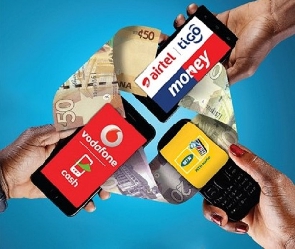The Bank of Ghana has said as of December 2018, there were 32.6 million mobile money accounts.
Speaking at a workshop organised by telecommunication company MTN for the Journalist for Business Advocacy (JBA) on Thursday, 11 July 2019 in Accra, First Deputy Governor of the Bank of Ghana, Dr Maxwell Opoku-Afari said: “Recent developments suggest that mobile money technology has evolved and gained public acceptance, and in almost a decade, contributed significantly toward financial inclusion in the country.
“For instance, the number of mobile money accounts has reached 32.6 million in December 2018 compared with 3.8 million in December 2012. Total float balances as of December 2012 was GHS19.6 million compared with GHS2.6 billion recorded in December 2018”.
Dr Opoku-Afari also said the central bank will be strengthening mobile money operations in Ghana through the creation of an enabling environment by removing price distortions, promoting competition and protecting the interest of the consumers.
Dr Opoku-Afari said the success of mobile money transactions in advancing financial inclusion cannot be overemphasised, but added that there is still scope for further expansion.
“We need to focus on areas such as pricing of digital financial services to promote competitive practices to foster increased usage. Broadly, market players are seeking to lower costs and increase access channels to make digital financial services affordable to the general public.
“To be successful, electronic payment products should be affordable and sustainable. And, sustainability requires leveraging an enlarged network, which supports payment service providers to build a critical mass and achieve the desired economies of scale. In this regard, collaborative efforts with the financial digital space to develop and share infrastructure should be encouraged. This could be the needed enabler to promote the modernisation of the payment system.
“Another equally important aspect that requires attention is strengthening transaction security to minimise fraud and instil confidence in the use of electronic payments. Counter-fraud measures and risk management practices should be effective and proportionate to each service providers risk levels. These factors would require the attention of stakeholders as collectively, we progress toward a more cash-lite society to ensure secure, affordable and convenient digital financial services”, the First Deputy Governor said.
He added: “For mobile money entities and fintechs to be successful in an increasingly competitive payment ecosystem, the industry needs to have a long-term view and be ready to build sustainable and affordable electronic payment solutions that meet the needs of diverse clientele in the society.
“Let me note that the Bank of Ghana will continue to create the enabling environment by removing price distortions, promoting competition and protecting the interest of the consumers.”
Business News of Friday, 12 July 2019
Source: classfmonline.com
MoMo accounts hit 32.6m; BoG to remove price distortions
Business
















